Best Oncology Treatment in India
India has emerged as a global leader in providing high-quality oncology care, attracting patients from all corners of the world seeking affordable, advanced cancer treatment. With state-of-the-art medical facilities, cutting-edge technology, and highly skilled oncologists, India offers a comprehensive range of treatments for various types of cancer. This article will delve into why India is a preferred destination for oncology treatment, the types of cancer treatments available, leading hospitals and specialists, and what patients can expect during their treatment journey.
Contact us Full Support and Guide : 008700672272
Why Choose India for Oncology Treatment?
India’s reputation as a leading destination for oncology treatment is built on several key factors:
- World-Class Medical Expertise:
- India boasts a vast pool of highly qualified and experienced oncologists, many of whom have trained at top institutions worldwide. These specialists are well-versed in the latest advancements in cancer treatment, ensuring that patients receive care that is on par with global standards.
- Advanced Technology and Infrastructure:
- Indian hospitals are equipped with the latest technology for cancer diagnosis and treatment. This includes advanced imaging techniques, robotic surgery, precision medicine, and cutting-edge radiation therapy equipment. The availability of such technologies ensures that patients receive accurate diagnoses and effective treatments.
- Cost-Effective Treatment:
- One of the most significant advantages of seeking oncology treatment in India is the cost. The overall cost of cancer treatment in India is considerably lower than in Western countries, without compromising the quality of care. This affordability makes India an attractive option for international patients, especially those from countries with high healthcare costs.
- Comprehensive Care:
- Indian hospitals provide a holistic approach to cancer care, offering everything from diagnosis to treatment, rehabilitation, and palliative care under one roof. This ensures that patients receive continuous and coordinated care throughout their treatment journey.
- Accessibility and Convenience:
- With a growing number of JCI (Joint Commission International) accredited hospitals, India is well-prepared to cater to international patients. Many hospitals offer dedicated international patient services, including assistance with medical visas, travel arrangements, accommodation, and language translation.
Types of Oncology Treatments Available in India
India offers a comprehensive range of oncology treatments, covering all major types of cancer. These treatments are personalized to meet the specific needs of each patient and are administered by multidisciplinary teams of oncologists, surgeons, radiologists, and other specialists.
- Surgical Oncology:
- Surgical oncology involves the removal of cancerous tumors and surrounding tissues through surgery. India is known for its expertise in minimally invasive and robotic surgeries, which offer quicker recovery times, reduced pain, and smaller incisions compared to traditional surgery. Leading hospitals in India perform complex procedures such as organ-preserving surgeries, laparoscopic surgeries, and reconstructive surgeries for various cancers.
- Medical Oncology:
- Medical oncology includes chemotherapy, hormone therapy, immunotherapy, and targeted therapy. These treatments are designed to attack cancer cells, shrink tumors, or prevent cancer from spreading. India’s medical oncologists are proficient in administering these therapies, using the latest drugs and protocols to achieve the best outcomes.
- Chemotherapy involves the use of drugs to destroy cancer cells. India offers advanced chemotherapy protocols that are tailored to each patient’s specific type and stage of cancer.
- Immunotherapy boosts the body’s immune system to fight cancer, while targeted therapy focuses on specific molecules involved in cancer growth. These therapies are particularly effective in treating cancers such as melanoma, lung cancer, and certain types of breast cancer.
- Hormone therapy is used for cancers that are sensitive to hormones, such as breast cancer and prostate cancer.
- Radiation Oncology:
- Radiation therapy uses high-energy rays or particles to destroy cancer cells. India’s top oncology centers are equipped with advanced radiation therapy technologies, including:
- Intensity-Modulated Radiation Therapy (IMRT): IMRT allows for precise targeting of cancer cells while minimizing damage to surrounding healthy tissue.
- Image-Guided Radiation Therapy (IGRT): IGRT uses imaging techniques to improve the accuracy of radiation delivery, enhancing the effectiveness of treatment.
- Stereotactic Radiosurgery (SRS) and Stereotactic Body Radiotherapy (SBRT): These advanced forms of radiation therapy deliver high doses of radiation to small, well-defined tumors, often in a single session.
- Bone Marrow Transplantation (BMT):
- Bone marrow transplantation is a specialized procedure used to treat blood cancers such as leukemia, lymphoma, and multiple myeloma. India is home to several centers of excellence for bone marrow transplants, offering both autologous (using the patient’s own stem cells) and allogeneic (using donor stem cells) transplants. These centers are equipped with modern facilities and adhere to strict protocols to ensure successful outcomes.
- Palliative Care:
- Palliative care is an essential component of cancer treatment, focusing on improving the quality of life for patients with advanced cancer. Indian hospitals offer comprehensive palliative care services, including pain management, psychological support, and end-of-life care. This holistic approach helps patients and their families navigate the emotional and physical challenges associated with cancer.
What to Expect During Your Oncology Treatment Journey in India
The process of receiving oncology treatment in India is designed to be as seamless and stress-free as possible for international patients. Here’s what you can expect during your treatment journey:
- Pre-Treatment Consultation:
- Upon arrival in India, patients undergo a thorough evaluation, including diagnostic tests such as blood tests, imaging studies, and biopsies. Based on these results, the oncology team will develop a personalized treatment plan tailored to the patient’s specific type and stage of cancer.
- Treatment Phase:
- Depending on the treatment plan, patients may undergo surgery, chemotherapy, radiation therapy, or a combination of these modalities. Each phase of treatment is closely monitored by a team of specialists, ensuring that the patient receives the best possible care.
- Post-Treatment Care:
- After the primary treatment is completed, patients receive follow-up care, including regular check-ups, imaging studies, and blood tests to monitor for any signs of recurrence. Post-treatment care may also include rehabilitation services, nutritional counseling, and psychological support.
- Palliative and Supportive Care:
- For patients with advanced cancer, palliative and supportive care is provided to manage symptoms and improve the quality of life. This includes pain management, psychological support, and assistance with daily activities.
- Patient Support Services:
- Many hospitals in India offer comprehensive support services for international patients, including assistance with travel arrangements, accommodation, language translation, and medical visa processing. These services ensure that patients can focus on their treatment without worrying about logistical challenges.
India’s emergence as a global hub for oncology treatment is driven by a combination of world-class medical expertise, advanced technology, and affordable care. Patients from around the world choose India for its comprehensive cancer treatment options, ranging from surgery and chemotherapy to advanced radiation therapy and bone marrow transplantation. With leading hospitals and highly skilled oncologists, India offers hope and healing to those battling cancer.
At Rahat Medical Tourism, we are committed to guiding patients through every step of their oncology treatment journey in India. From initial consultations to post-treatment care, our team is dedicated to ensuring that each patient receives the highest standard of care in a compassionate and supportive environment. Whether you are seeking treatment for yourself or a loved one, we are here to help you navigate the complexities of cancer care and achieve the best possible outcome.

Lung Cancer Treatment in India Starting at $8,000
The total cost depends on the diagnosis and facilities chosen by the patient.
Lung cancer is characterized by the uncontrolled growth of cells originating in the lungs. Typically, it starts in the cells lining the air passages. Instead of forming healthy lung tissue, these cells divide uncontrollably, leading to the formation of tumors. Lung cancer can grow and spread to other parts of the body through a process known as metastasis. While lung cancer can develop in any part of the lung, approximately 90% of cases begin in the epithelial cells lining the airways, known as bronchi and bronchioles. This is why lung cancer is sometimes referred to as bronchogenic cancer or bronchogenic carcinoma. It is the most common cancer globally and the leading cause of cancer-related deaths in both men and women.
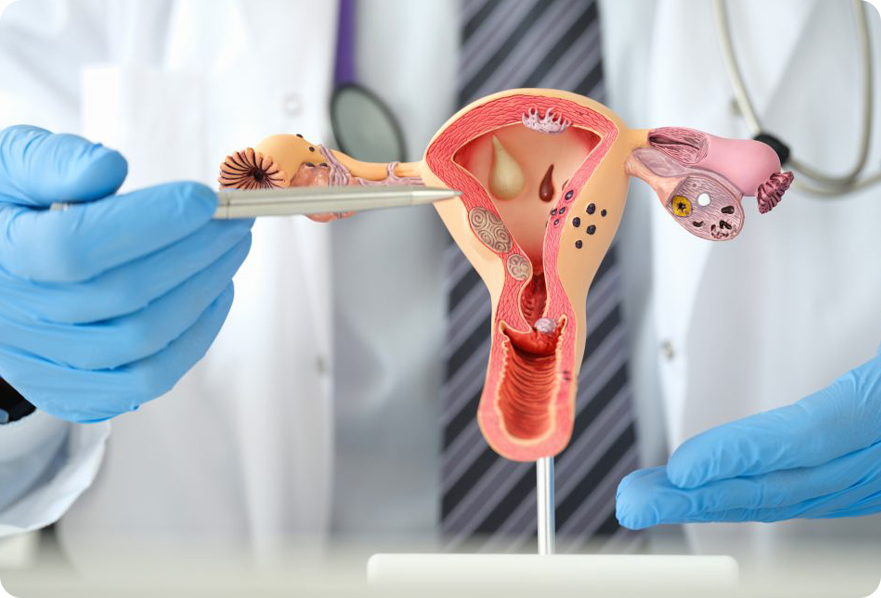
Uterine Cancer Treatment in India Starting at $3,000
The total cost depends on the diagnosis and facilities chosen by the patient.
Uterine cancer, as the name suggests, begins in the endometrium, the lining of the uterus. While it is a relatively rare form of cancer, it can persist over a medium-term duration. The most advanced stage of this cancer is Stage IV, where it becomes the most extensive. A medical diagnosis is essential to confirm uterine cancer, supported by lab tests and imaging studies. Diagnostic procedures often include a pelvic exam, Pap test, ultrasound, biopsy, and in some cases, a CT scan or MRI. The primary treatment for uterine cancer is surgery to remove the uterus. Depending on the stage of the cancer, additional treatments such as chemotherapy or radiation may be required in more advanced cases.
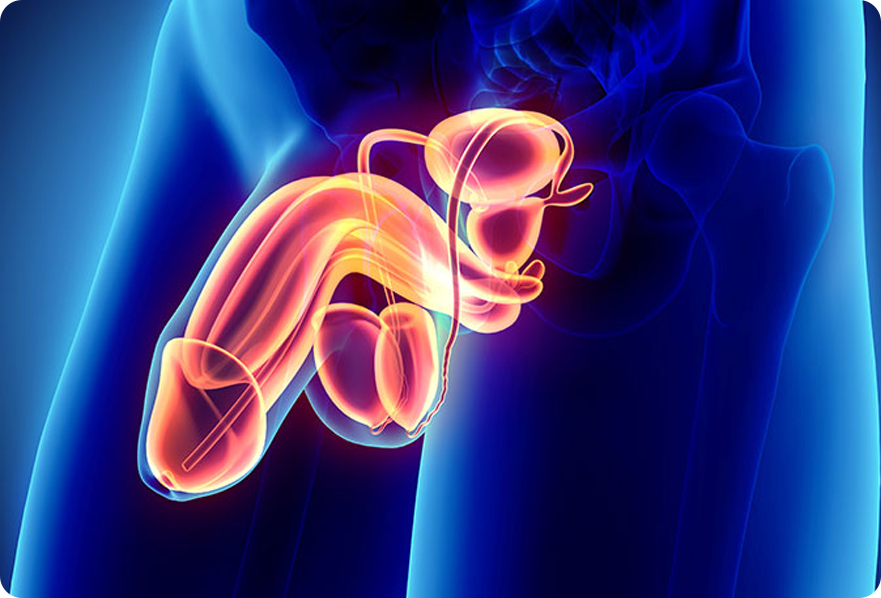
Prostate Cancer Treatment in India Starting at $5,000
The total cost depends on the diagnosis and facilities chosen by the patient.
The prostate is a gland in the male reproductive system responsible for producing fluid that is a crucial component of semen. Prostate cancer begins when cells within the prostate gland start to grow abnormally. Prostate cancer is one of the most common cancers in men over the age of 60. In many cases, it grows slowly and may go undetected without causing any issues. However, in some instances, the cancer can be aggressive and spread to other parts of the body, leading to metastatic prostate cancer. This disease typically progresses slowly, beginning with small changes in the shape and size of prostate cells. The risk of developing prostate cancer increases with age, and it is rarely seen in men under 40. Consequently, many men may live to old age without ever knowing they had prostate cancer.
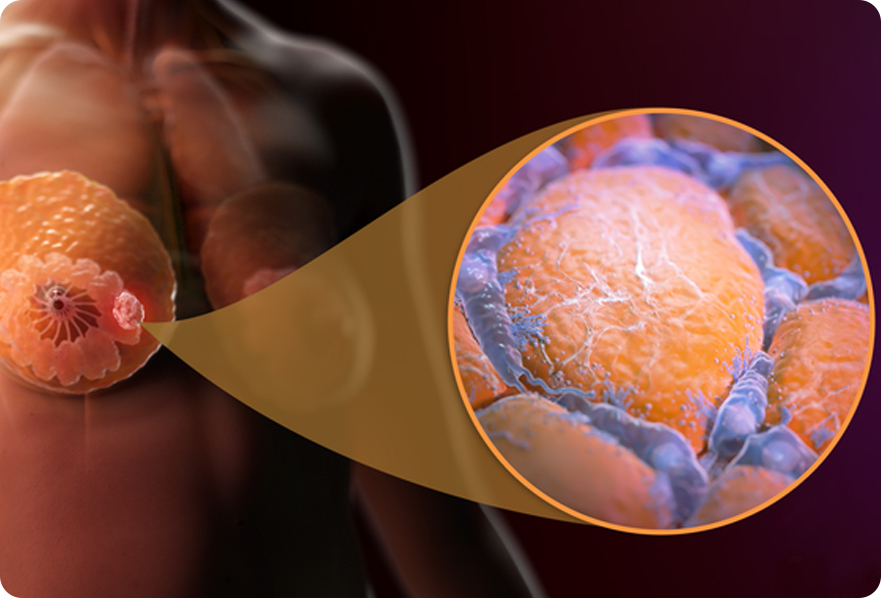
Breast Cancer Treatment in India Starting at $3,000
The total cost depends on the diagnosis and facilities chosen by the patient.
Recent advancements in breast cancer treatment have significantly improved the way women are diagnosed and treated for this condition. These developments enable doctors to create personalized treatment plans tailored to each patient’s unique characteristics and needs. The various treatment options now available target the complex mix of cancer cells, making it possible to address cases that might be challenging with traditional methods. Once a breast cancer diagnosis is confirmed, treatment is promptly initiated by the medical team. Before exploring the different treatment options, it’s important to understand how breast cancer develops, as well as its symptoms and diagnostic methods.
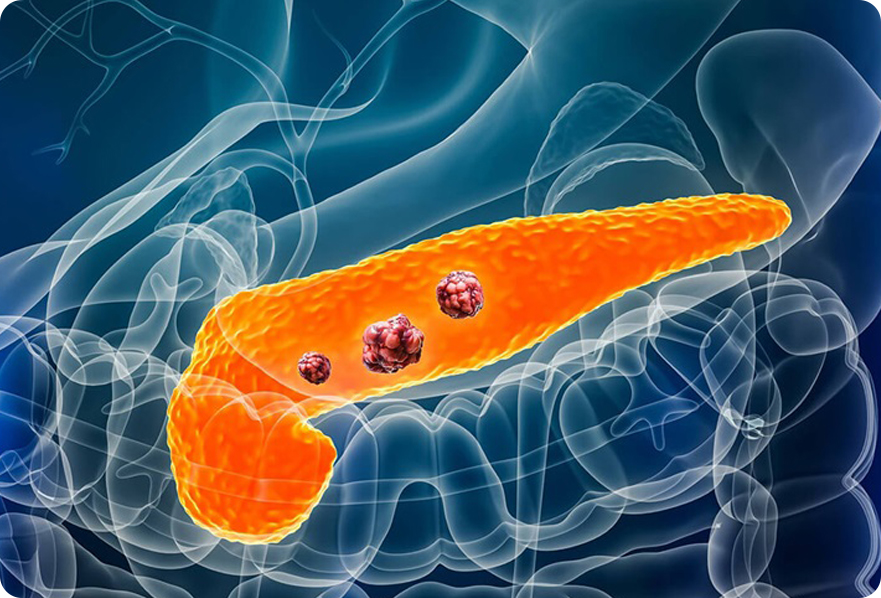
Pancreatic Cancer Treatment in India Starting at $8,800
The total cost depends on the diagnosis and facilities chosen by the patient.
Pancreatic cancer originates in the cells and tissues of the pancreas, a vital organ responsible for producing digestive enzymes and the hormone insulin, which regulates blood sugar levels. The pancreas can develop both non-cancerous and cancerous tumors, with the most common type being pancreatic ductal adenocarcinoma. This form of cancer begins in the cells lining the ducts that transport enzymes from the pancreas. Pancreatic cancer is often diagnosed at an advanced stage when it has already spread to nearby organs, making treatment more challenging. Diagnosis typically occurs after specific symptoms become noticeable.

Chemotherapy in India Starting at $300
The total cost depends on the diagnosis and facilities chosen by the patient.
Chemotherapy is a standard treatment involving the administration of various drugs to target and destroy cancer cells. Often used with curative intent, chemotherapy aims to prolong life and alleviate symptoms by shrinking tumors and controlling cancer growth. It is one of the primary methods used in medical oncology, offering an alternative to surgical procedures for many patients worldwide.
While chemotherapy is a common and effective cancer treatment, many patients are concerned about its side effects, which can impact their quality of life. However, advancements in treatment protocols have made it possible to manage these side effects better, improving patient comfort during therapy.
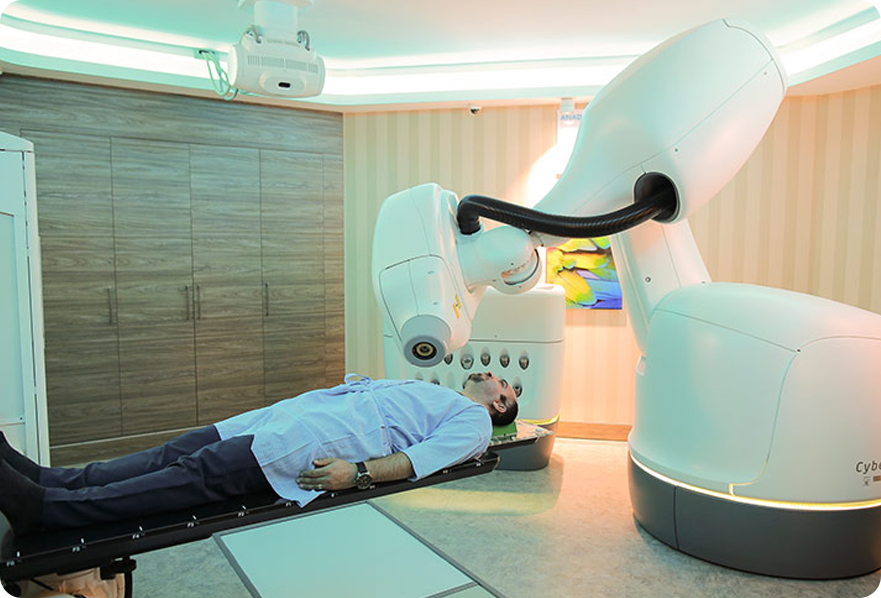
CyberKnife Treatment in India Starting at $6,000
The total cost depends on the diagnosis and facilities chosen by the patient.
CyberKnife technology is now widely used for the treatment of tumors in the lungs, prostate, head and neck, spine, liver, kidneys, and pancreas. It serves as an alternative for tumors that are inoperable or too complex to remove surgically. The CyberKnife system utilizes robotic precision to deliver highly accurate radiation doses directly to the tumor site. Depending on the tumor’s size, type, and location, treatment is typically completed in one to five sessions. CyberKnife is a form of radiosurgery, offering the effectiveness of traditional surgery but through non-invasive, targeted radiation therapy.
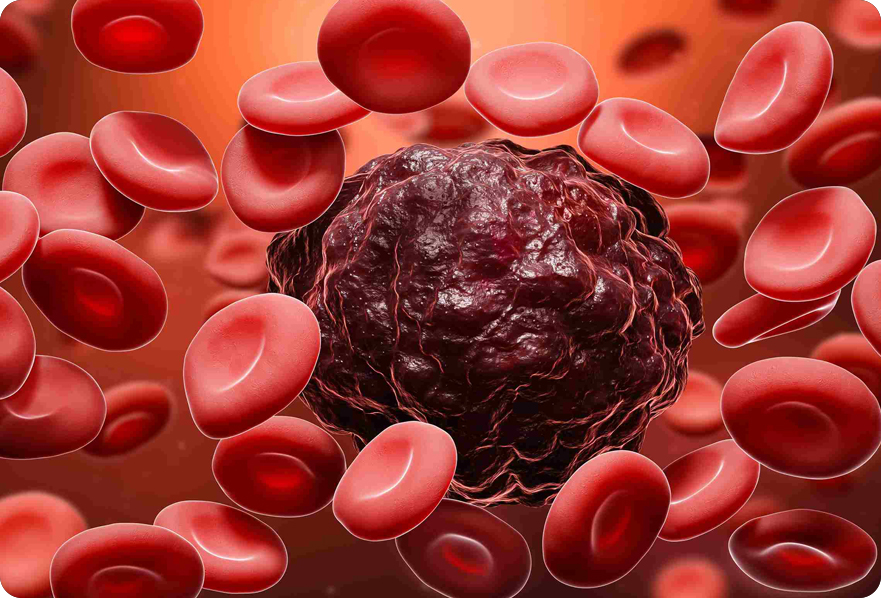
Blood Cancer Treatment in India Starting at $800
Blood cancer is a broad term encompassing cancers that affect the blood, bone marrow, and lymphatic system. These cancers typically originate in the bone marrow and spread through the blood vessels. The presence of abnormal blood cells disrupts the body’s ability to fight infections and control bleeding. Blood cancers are primarily classified into three types based on the affected blood cells: leukemia, lymphoma, and myeloma. Treatment for blood cancer varies significantly depending on the specific case. In cases of slow-growing cancers, a “watch and wait” approach may be adopted. However, for more aggressive forms, chemotherapy combined with bone marrow transplantation is often necessary.

Skin Cancer Treatment in India Starting at $4,000
The total cost depends on the diagnosis and facilities chosen by the patient.
Skin cancer is the most common type of cancer, particularly affecting individuals with lighter skin tones. It results from the uncontrolled and abnormal growth of malignant skin cells. This occurs when DNA damage in skin cells, often due to ultraviolet (UV) radiation from sunlight or tanning beds, triggers mutations. These mutations cause the cells to multiply rapidly, forming malignant tumors.
While skin cancer is generally localized and has limited potential to spread to other parts of the body, it can become life-threatening if not treated promptly. Most skin cancers are treatable, though some forms can be more challenging to manage. Early detection and treatment significantly increase the chances of successful outcomes.

The cost of Lymphoma treatment for international patients in India starts at USD 1,800.
Hodgkin Lymphoma is a type of cancer that develops in lymphocytes, a form of white blood cell. As the cancer progresses, it weakens the body’s ability to combat infections.
Treatment for Hodgkin Lymphoma typically involves chemotherapy and radiation therapy, with bone marrow transplants being required in rare cases.
Patients usually need to stay in the hospital for about 5 days, followed by 15 days of outpatient care. The total cost of treatment varies based on the specific diagnosis and the facilities chosen by the patient.

Bone Cancer Treatment in India Starting at $5,400
Bone cancer refers to the abnormal growth of cells or tissues within the bone. It includes cancers that originate in the bone itself, but excludes those that start elsewhere in the body and spread to the bone. Common symptoms of bone cancer include: 1. Persistent bone pain, 2. Swelling in the affected area, 3.Tenderness around the bone , 3. Fatigue
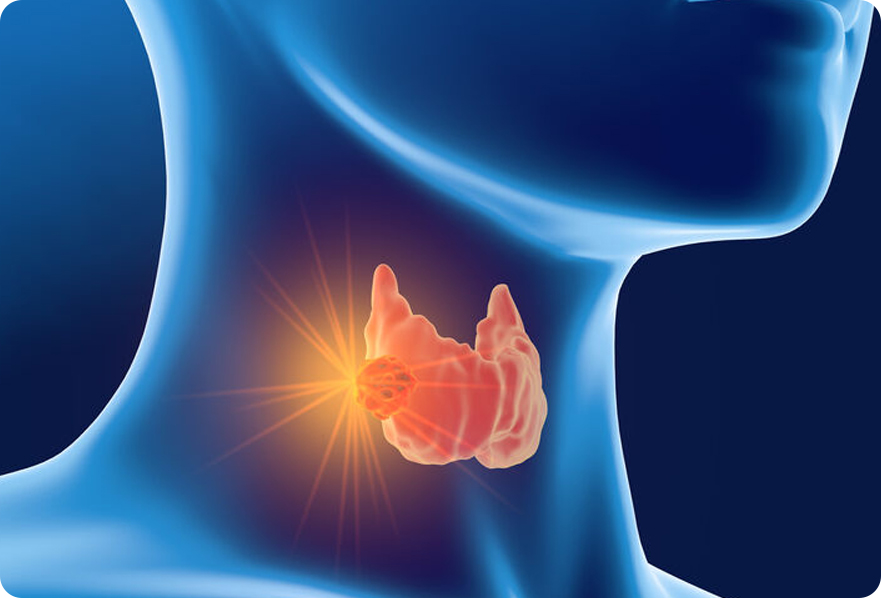
Papillary Thyroid Cancer Treatment in India Starting at $3,150**
Thyroid cancer is a condition characterized by the abnormal growth of cells within the thyroid gland, which is located at the base of the neck, just below the Adam’s apple. This butterfly-shaped gland plays a crucial role in regulating heart rate, blood pressure, body temperature, and body weight through hormone production. In its early stages, thyroid cancer often does not present any symptoms. However, as the tumor grows, it can lead to noticeable signs such as swelling in the neck, changes in voice, and difficulty swallowing.

Liver cancer is one of the most challenging types of cancer to treat, but with advancements in medical technology and the availability of specialized care, India has become a leading destination for liver cancer treatment. Offering world-class healthcare services at a fraction of the cost compared to Western countries, India provides comprehensive treatment options that cater to both local and international patients.

